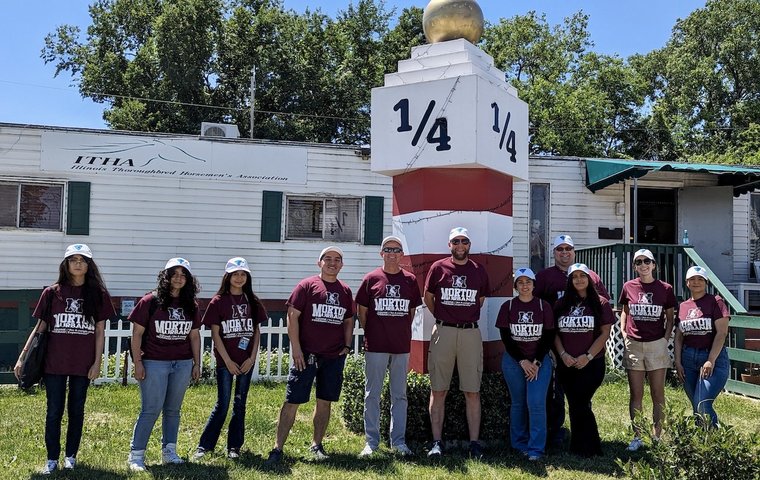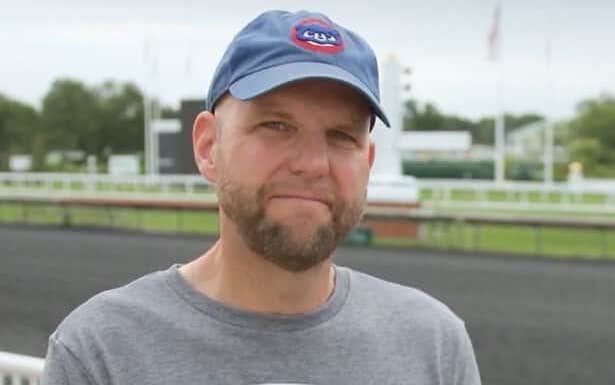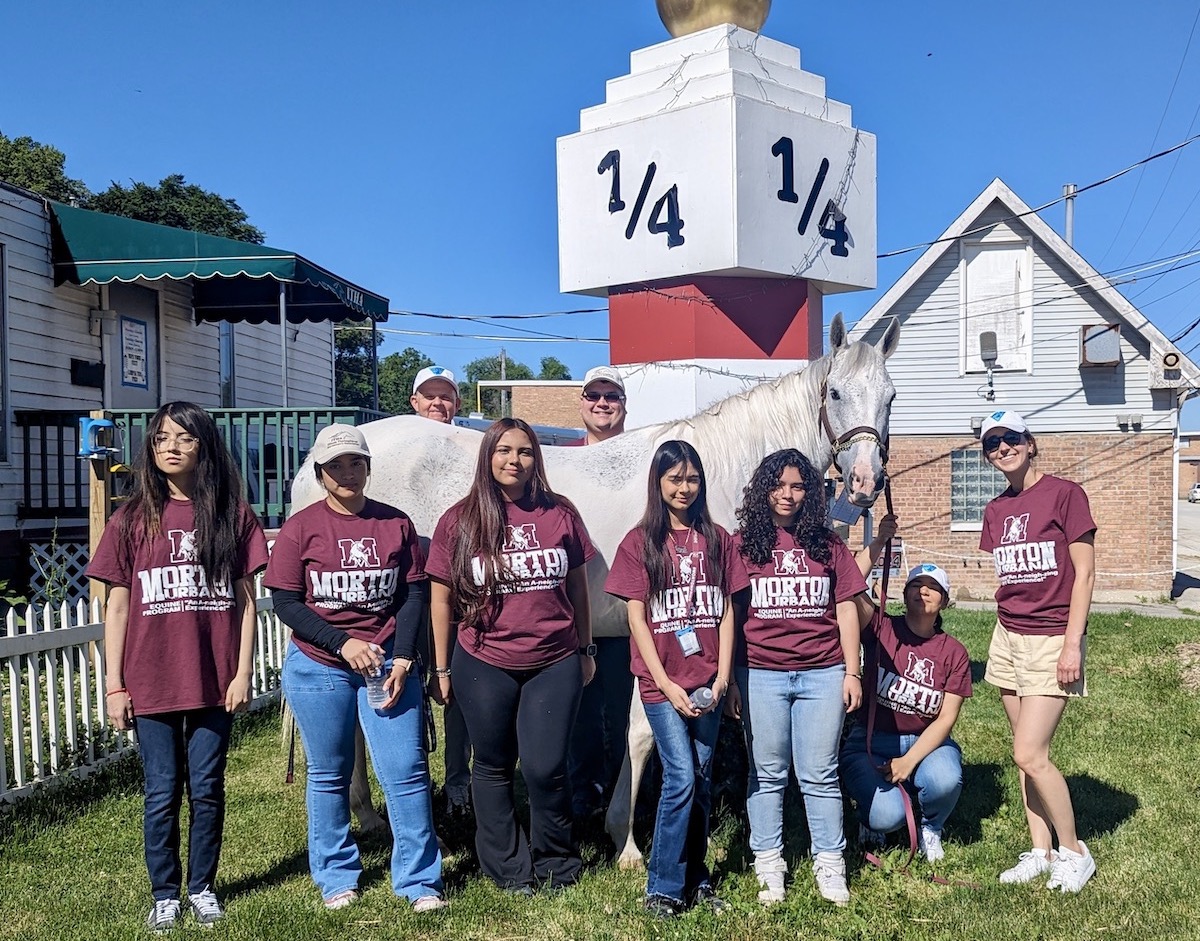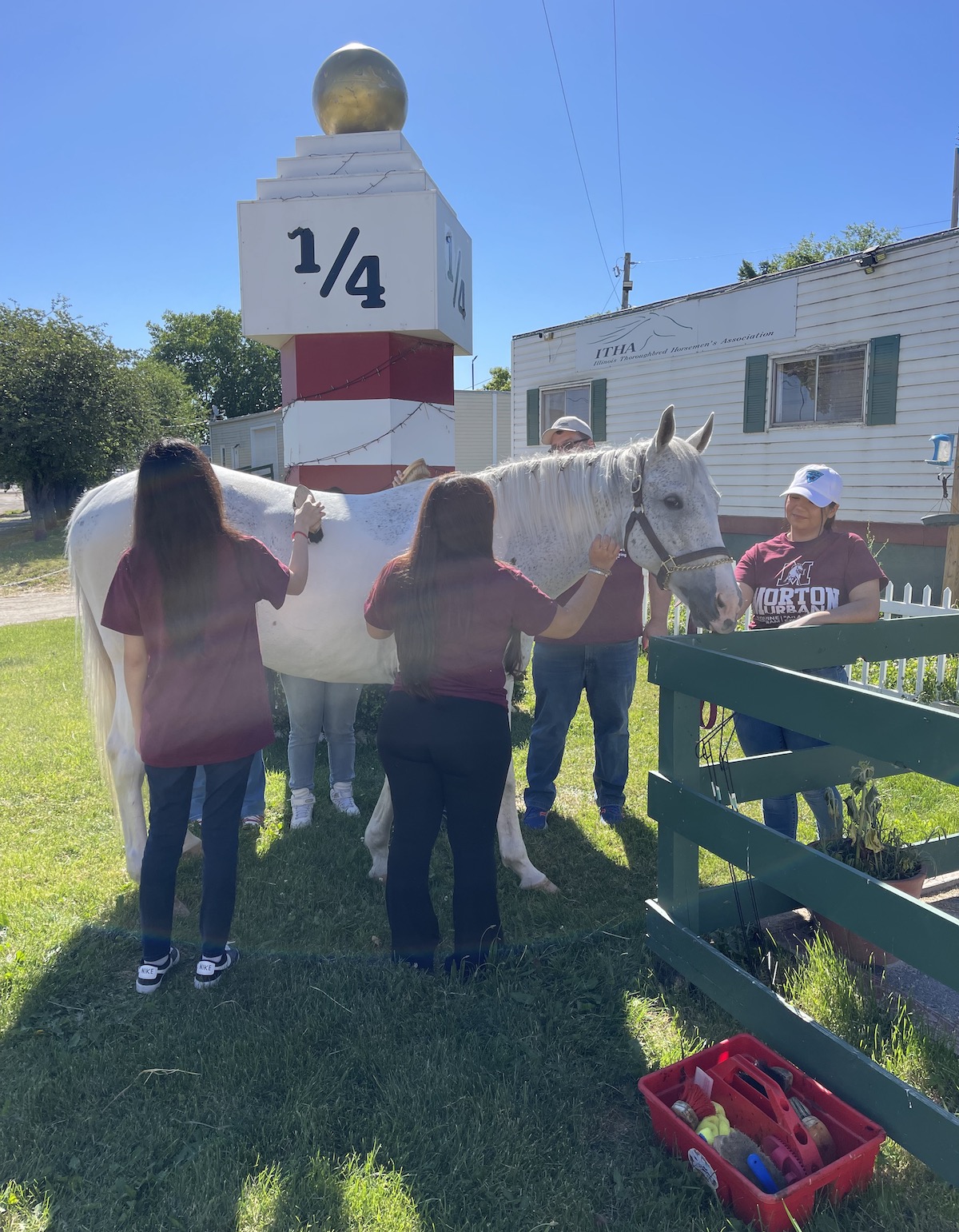
A pioneering program in the Chicago suburbs introduced a group of High School students to the sport at Hawthorne – as Annise Montplaisir, executive director of Amplify Horse Racing, reports
Cicero, Illinois, is a suburb that hugs the west side of Chicago, and is home to Hawthorne Race Course. It’s also the headquarters of Morton High School District 201, which serves approximately 8,000 students from Cicero and surrounding communities.
Near the top of the Hawthorne stretch is a Golden Corral parking lot. From this vantage point you can clearly see horses on the track during training or racing.
 One morning while watching training from here, trainer Chris Block saw a group of Morton High School students gathered by a fence observing the horses. An idea popped into his head: “We should bring more of those students to the track.”
One morning while watching training from here, trainer Chris Block saw a group of Morton High School students gathered by a fence observing the horses. An idea popped into his head: “We should bring more of those students to the track.”
Last week, the Illinois Backstretch Charitable Foundation (IBCF), the benevolent arm of the Illinois Thoroughbred Horsemen’s Association (ITHA), in collaboration with Amplify Horse Racing and the Morton High School District 201, did just that by hosting the inaugural Morton Urban Equine Program – and it was a tremendous success.
All I could think about on my drive home to Kentucky was how it was one of the most impactful outreach programs I have been involved with since the start of Amplify.
Block is president of the ITHA, which is led by executive director David McCaffrey. He and IBCF program coordinator George Moreno reached out to me in February, looking for program development help from Amplify, and we decided to tackle the project together.
The ITHA team presented the concept of hosting students at Hawthorne to the school district, who jumped at the opportunity to connect their students with horses and suggested the creation of a four-day summer enrichment program. From there, the ITHA and Amplify worked on a schedule and syllabus of topics and activities, and the school district handled the registration of students.
 We had anticipated a relatively small group for our first year, and the final attendance resulted in five high school junior and senior girls and their science teacher, Kyle Boyd.
We had anticipated a relatively small group for our first year, and the final attendance resulted in five high school junior and senior girls and their science teacher, Kyle Boyd.
Minimal prior experience
The students’ minimal prior horse experiences spanned from never having touched a horse to going on a leadline ride.
Throughout the four days of the Urban Equine Program, the students arrived at the ITHA office in a small bus, and for three hours experienced the daily activity of a racetrack firsthand while learning industry practices, horsemanship, and applied science.
They had the opportunity to groom a horse, feed copious amounts of peppermints to dozens of racehorses, ride around the track in tractors, peer into a scope at a horse’s respiratory tract, and even go on (what was for most of them) their first ever horse ride. By day three, one student told us she was having so much fun she wished the program were longer.
Instrumental in the success of this program was the genuine commitment and enthusiasm from the ITHA team. David and George took active roles in the planning, and communication with the school district, as well as the day-to-day teaching.
Horsemen’s liaison Mena Perez even shared her very special lead pony, Bandit, as our mascot and teaching assistant for everything from grooming lessons to a test barn demonstration and pony rides.
 Chris Block and his assistant Martin Martinez shared their barn as a teaching space, amidst training and caring for around 35 head of horses. Chris served as an educator each day, and invited the students to be part of every step of training, from understanding the role of nutrition and the feed room, to hearing the importance of hoof care while watching a horse get trimmed and reshod. His horses also received the vast majority of the aforementioned peppermints.
Chris Block and his assistant Martin Martinez shared their barn as a teaching space, amidst training and caring for around 35 head of horses. Chris served as an educator each day, and invited the students to be part of every step of training, from understanding the role of nutrition and the feed room, to hearing the importance of hoof care while watching a horse get trimmed and reshod. His horses also received the vast majority of the aforementioned peppermints.
To conclude day four, we asked the students to complete a feedback survey. Nearly all of them conveyed that just being in the presence of horses and getting to touch them was the most special part of the entire experience.
They also reflected strongly on how much they learned about racing, veterinary medicine, and the great care they observed the horses receiving.
Four of the five students expressed interest in becoming veterinarians, and one specifically asked how she can pursue a job at the racetrack in the near future.
Amqazing, fun, unforgettable
Most telling of all was the handwritten thank you card the students handed over before climbing back on the bus to leave the track one last time. One message read “Thank you all for taking care of us and giving us all these wonderful lessons. It was an amazing, fun, unforgettable experience that we won’t be forgetting any time soon.”
There were several moments from this program that will stick with me for a long time: watching all five students grooming Bandit and softly petting him as he munched grass; the laughter as they climbed into the starting gate like assistant starters; the beaming smiles as they stepped down from the big John Deere tractors after riding around the track; the even bigger smiles as they sat tall on Bandit’s back.
The ITHA team and I went into the week understanding that the program was a trial run, and would serve as a learning experience for all of us. We came out of it knowing that we had positively impacted the five teenage girls who had attended.
Without this program, those students might never have had the chance to truly be around horses. But as a result of it, they experienced moments they will never forget.
Massive potential
Racetracks have massive potential to serve as centers for learning within the communities where they reside. In many highly urban and inner-city areas, racetracks are the only places for miles and miles where people can go to see and possibly touch a horse. That’s certainly what Hawthorne is for Cicero.
At Amplify, our vision is to leverage the Thoroughbred industry to connect youth, families, students, and educators with opportunities to learn about and engage with horses. But in order to make those connections, we have to create the opportunities.
The ITHA developed an unforgettable opportunity through the Morton Urban Equine Program, and I’m excited for all of the students who will get to learn about horses and experience the excitement of racing as the program grows.
• Annise Montplaisir is executive director of Amplify Horse Racing, a youth-focused 501(c)(3) organization dedicated to amplifying education, mentorship, and career opportunities for young people in the Thoroughbred horse industry.
• Visit the Amplify Horse Racing website and the Hawthorne Race Course website
Maritime Traveler keeping the Secretariat show on the road
View the latest TRC Global Rankings for horses / jockeys / trainers / sires


